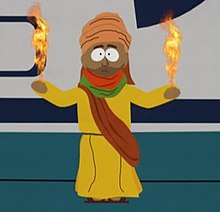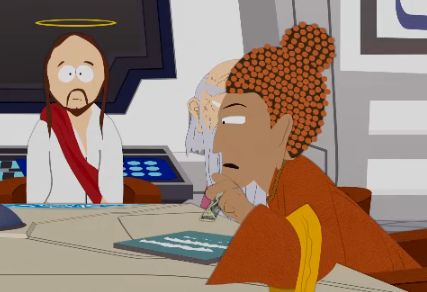Prove Me Wrong
December 11, 2011 2 Comments
“We kind of think Comedy Central pussed out on this whole thing. We still do.” – Matt Stone
I have a feeling this blog isn’t going to change anything. I think Comedy Central won’t back down on their decision because of the controversy. They made a choice and now they have to stick to it. When South Park first brought up the issue of Muhammad in “Cartoon Wars,” nobody was ever threatened. Comedy Central still chose to censor it, however. Then, when Parker and Stone wanted to revisit the topic in “200,” Comedy Central still said no. That’s why it was turned into a two part episode.*
It’s not so much the censoring of Muhammad, that bothered me as much as the extended bleeps over the final speeches. The four boys are the voice of reason in the show, and South Park has a tradition in their episodes at the end. Once the conflict is solved, one of the boys give a final speech that always starts with, “You know, I learned something today…” This was South Park’s 200th and 201st episodes. They had a reference to all their major moments in past episodes. It was a fan’s dream, but when it got to the end, the classic “I learned something” speech is totally bleeped the fuck out! My jaw dropped as the TV blared the same high-pitched note for a minute. I couldn’t figure out whether it was Comedy Central’s doing or Matt and Trey making a point about censorship. It turns out it was Comedy Central. Parker and Stone gave a response the next day:
“In the 14 years we’ve been doing ‘South Park’ we have never done a show that we couldn’t stand behind. We delivered our version of the show to Comedy Central and they made a determination to alter the episode. It wasn’t some meta-joke on our part. Comedy Central added the bleeps. In fact, Kyle’s customary final speech was about intimidation and fear. It didn’t mention Muhammad at all but it got bleeped too. We’ll be back next week with a whole new show about something completely different and we’ll see what happens to it” (www.southparkstudios.com).
They didn’t have to alter the speech. Censoring Muhammad, I can at least understand, but the final speech? That was censoring South Park. That was censoring MY religion. That was Comedy Central protecting themselves since they sided with intimidation and fear. They didn’t like what Kyle, Cartman, and Santa had to say against terrorism, because Comedy Central gave into it. It would have been embarrassing to air an episode with Muhammad censored out of fear, and the moral of the story saying you shouldn’t act out of fear.
But hey, prove me wrong, Doug. Prove me wrong, and do the right thing.
Uncensor South Park.

